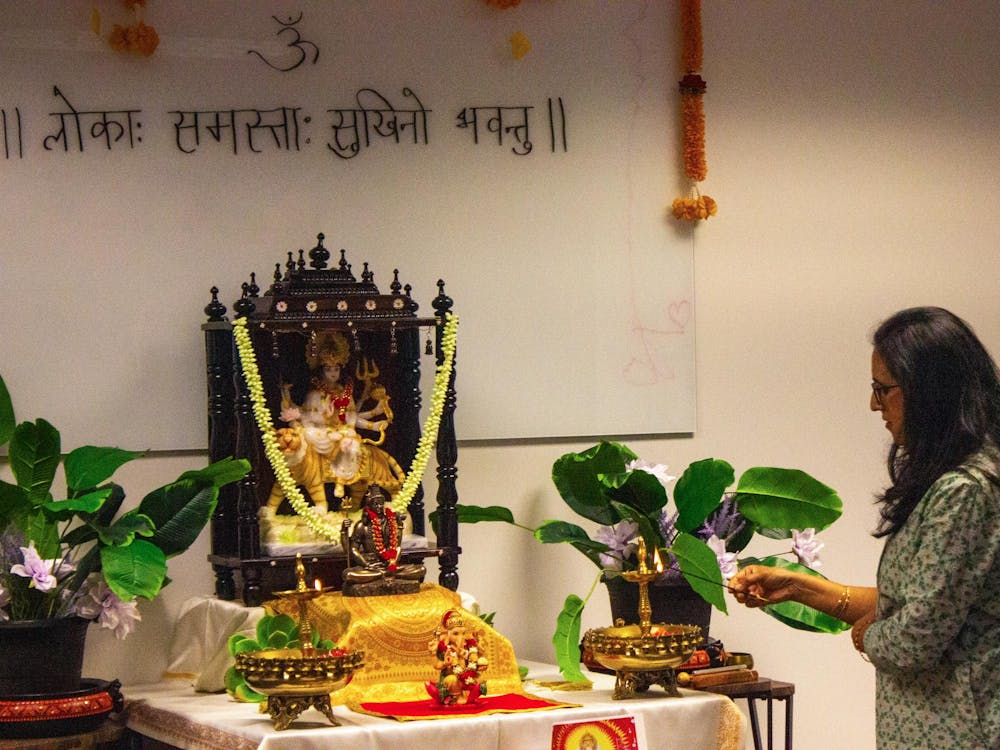While most students are grabbing an early dinner in the Brodhead Center or working out in Wilson or Brodie, a little-known weekly gathering takes place on Thursdays at 6 p.m. in Duke’s Hindu Life Room.
During Satsang, Duke’s Hindu chaplain, Priya Amaresh, leads undergraduate and graduate students in philosophical discussions on Hindu scriptures.
Priya-ji, as participants call her — ji is a term of respect in India and among Hindus — has led Satsang since becoming Duke’s Hindu chaplain in 2021.
A traditional Satsang discussion centers around the practical application of spiritual teachings to daily life.
“Satsang is bringing together those who want to sit together to think about and revel in the truths. These truths are given to us in the scriptures to understand. What are the teachings of the Bhagavad Gita? The Upanishads?” Amaresh said.
This year, Amaresh is focusing on the Bhagavad Gita, one of Hinduism’s holiest texts. Widely interpreted as a conversation between God and man, the book serves as a spiritual and philosophical guide. Amaresh chose the Gita due to its importance in Hindu scripture as part of the Mahabharata, one of the most notable Hindu Epics, and the relatable experiences and questions of the book’s human characters.
Most of the students who attend regularly are graduate students, although a few undergraduates try to make time to attend.
“I like having a space to feel calm and have a time in my week [to] be closer to God,” said first-year Aarushi Singh, who has become a regular since she started participating this semester. “I definitely come for the people and the community.”
Graduate students who attend, in contrast to American-born undergraduates, are mostly from India and see Satsang as a way to maintain a connection to their spiritual, religious and cultural roots.
Having grown up practicing Jainism, Raj Jain, a second-year master of engineering management student, was drawn to Satsang.
“It’s a way … to make sure my spiritual side is still alive,” said Jain, originally from Maharashtra, India. As someone who is not Hindu, Jain pointed to the “practical side” of Satsang, noting that the gathering is not solely focused on religion.
Rucha Patil, Graduate School ‘23, has consistently attended Satsang even after graduating.
“It feels like home … this place and meeting all the people, it reminds me of where I come from,” said the Pune, India, native. Patil is moving to Boston, but intends to join a local Satsang group if she can find one.
Students also look forward to being served prasad, food offered to God before being served and eaten, after the session ends around 7:30 p.m. Given the small weekly crowd of four to eight students, Amaresh cooks the food herself, except for during festivals when turnout is much higher than usual and about 25 people attend.
Typically, the chaplain serves traditional South Indian dishes such as Idli, which are Indian steamed rice cakes, with chutney or Pongal, a rice dish — and the students don’t waste any of it.
Having grown up in Michigan, Amaresh has experienced numerous challenges maintaining her spiritual life in the US.
She has noticed that among students on Duke’s campus, “there's a little bit of feeling like ‘I am not there yet, I'm not interested,’ until they come and experience it once or twice.”
“It should become part of a routine,” Amaresh said. “We don't take our faith as seriously as some communities do. We take it for granted. And we get caught up in the world; [we] kind of deviate from our spiritual path. I wish and hope that [somewhere] along the line, students will realize this is important too.”
Although she highly recommended Satsang for other students, Singh acknowledged that “everyone’s on their own personal journey, and everyone practices in different ways.”
“[It’s] definitely a great space for Hindus on Duke’s campus to connect with one another,” she added. “It’s a wonderful, wonderful program that Duke offers, and I am very grateful to be able to go each week.”
Get The Chronicle straight to your inbox
Signup for our weekly newsletter. Cancel at any time.
Samanyu Gangappa is a Trinity sophomore and local/national news editor for the news department.

